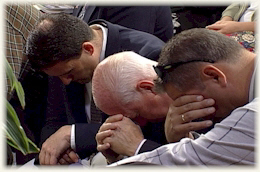Mirror neurons and neurotheology
 Mirror neurons (Wikipedia) are magical brain cells that fire both when performing some act and watching someone else perform it.
Mirror neurons (Wikipedia) are magical brain cells that fire both when performing some act and watching someone else perform it.
In this sense, they can be viewed as the key to learning and sharing behavior, tying the acts we perform to those of others and vice versa. Scholars such as M. Arbib have even proposed that they lie at the heart of language.
Now the NYT, in a Jan. 10 article entitled Cells That Read Minds , has given us a competent, if brief, overview of the field. This has been quite widely blogged.
What’s the neurotheology connection? Normally we think of mirror neurons as being activated via everyday motions such as reaching for a cup, or sticking out your tongue—something even one-day-old babies can imitate.
But what about religious behaviors? Such as bowing, prostrating yourself, or placing your hands together in prayer? If such motions stimulate mirror neurons, especially in young children, there may be grounds to argue that these are hard-wired physical behaviors.

February 15th, 2006 at 10:10
I liked the story of mirror neurons for a while, but some of the excitement over it seems so overblown. I read V.S. Ramachandran compare them to DNA for genetics, as if all of psychology would be explained this way. I don’t think so.
I have read others say that religion is all about a sense of connection beyond oneself. But it’s not all about that. Who am I? Who and what is the Other? What should I do about that? These are all just as important. Some want to simplify these to all being delusions. Some want to simplify them to all being a simple mechanism, like mirror neurons or any other theory that, “religion is only …”.
I don’t think those questions go away so easily.
March 7th, 2006 at 18:56
see my comments on the negative side HERE
June 24th, 2006 at 12:27
I’m interested in the relationship between mirror neurons and the mystical phenomena potentially inherent in the concept of transsubstantiation in the RC belief system. Mirror neurons may also be instrumental in rituals such as baptism, ordination, and reconciliation. This assumes that empathy is at the heart of love and that human “nature” requires second chances.
“In the beginning was the Word, and the Word was with God, and the Word was God (John1:1) . . . And the Word became flesh, and dwelt among us, full of grace and truth; we have beheld his glory, glory as of the only Son from the Father (John 1:14). If Jesus spoke of God, rather than the Lord God, then perhaps he instituted a process of worship which has allowed us to experience a loving God with intentions set forth in his life, and, with reference to transsubstantiation, at the Last Supper.
White gold? In spite of the influence of Paul, something within the history of the RC sustains Itself.
I’m not fluent in the relational potential of the human brain. I do wonder how mirror neurons in the premotor cortext might facilitate the limbic system. R. Joseph presented a compelling description of the limbic system as the “transmitter to God.”
May 6th, 2007 at 14:41
i thought that the story on the neurological cells or “mirror cells” if you will, was quite interesting however, i came to this website to figure out the primal function of neurological cells after reading this it was only somewhat clear to me.